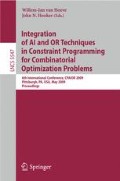Abstract
In scheduling using constraint programming we usually reason only about possible start times and end times of activities and remove those which are recognized as unfeasible. However often in practice there are more variables in play: variable durations of activities and variable resource capacity requirements. This paper presents a new algorithm for filtering maximum durations and maximum capacity requirements for discrete cumulative resources. It is also able to handle optional interval variables introduced in IBM ILOG CP Optimizer 2.0. Time complexity of the algorithm is \({\mathcal O}(n {\rm log} n)\). The algorithm is based on never published algorithm by Wim Nuijten and a on slightly modified e-feasibility checking algorithm by Armin Wolf and Gunnar Schrader. The later algorithm is also described in the paper.
Access this chapter
Tax calculation will be finalised at checkout
Purchases are for personal use only
Preview
Unable to display preview. Download preview PDF.
References
IBM ILOG CP Optimizer, http://www.ilog.com/products/cpoptimizer/
Mercier, L., van Hentenryck, P.: Edge finding for cumulative scheduling. Informs Journal of Computing 20(1), 143–153 (2008)
Philippe Baptiste, C.L.P., Nuijten, W.: Constraint-Based Scheduling: Applying Constraint Programming to Scheduling Problems. Kluwer Academic Publishers, Dordrecht (2001)
Philippe Laborie, J.R.: Reasoning with conditional time-intervals. In: Wilson, D., Lane, H.C. (eds.) Proceedings of the Twenty-First International Florida Artificial Intelligence Research Society Conference, Coconut Grove, Florida, USA, May 15-17, 2008, pp. 555–560. AAAI Press, Menlo Park (2008)
Schutt, A., Wolf, A., Schrader, G.: Not-first and not-last detection for cumulative scheduling in \(\uppercase{o}(n^3 \log n)\). In: Umeda, M., Wolf, A., Bartenstein, O., Geske, U., Seipel, D., Takata, O. (eds.) INAP 2005. LNCS, vol. 4369, pp. 66–80. Springer, Heidelberg (2006)
Vilím, P.: Global Constraints in Scheduling. PhD thesis, Charles University in Prague, Faculty of Mathematics and Physics, Department of Theoretical Computer Science and Mathematical Logic, KTIML MFF, Universita Karlova, Malostranské náměstí 2/25, 118 00 Praha 1, Czech Republic (2007), http://vilim.eu/petr/disertace.pdf
Wolf, A., Schrader, G.: \(\uppercase{o}(n \log n)\) overload checking for the cumulative constraint and its application. In: Umeda, M., Wolf, A., Bartenstein, O., Geske, U., Seipel, D., Takata, O. (eds.) INAP 2005. LNCS, vol. 4369, pp. 88–101. Springer, Heidelberg (2006)
Author information
Authors and Affiliations
Editor information
Editors and Affiliations
Rights and permissions
Copyright information
© 2009 Springer-Verlag Berlin Heidelberg
About this paper
Cite this paper
Vilím, P. (2009). Max Energy Filtering Algorithm for Discrete Cumulative Resources. In: van Hoeve, WJ., Hooker, J.N. (eds) Integration of AI and OR Techniques in Constraint Programming for Combinatorial Optimization Problems. CPAIOR 2009. Lecture Notes in Computer Science, vol 5547. Springer, Berlin, Heidelberg. https://doi.org/10.1007/978-3-642-01929-6_22
Download citation
DOI: https://doi.org/10.1007/978-3-642-01929-6_22
Publisher Name: Springer, Berlin, Heidelberg
Print ISBN: 978-3-642-01928-9
Online ISBN: 978-3-642-01929-6
eBook Packages: Computer ScienceComputer Science (R0)

